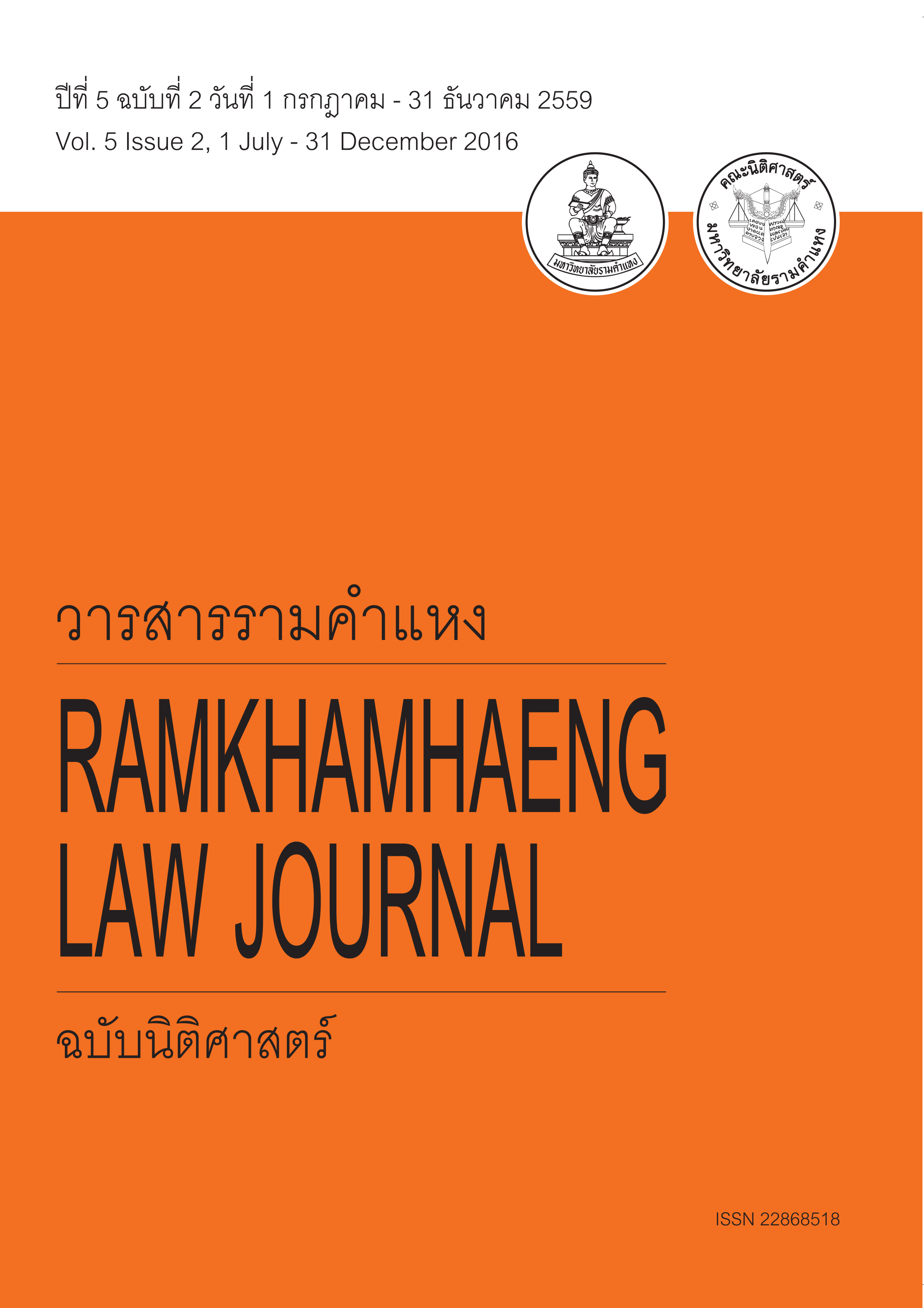การให้ความคุ้มครองท่าทางโยคะด้วยลิขสิทธิ์ในประเทศสหรัฐอเมริกา
Main Article Content
Abstract
ในสังคมปัจจุบันโยคะได้รับความนิยมจากผู้คนทุกเพศ ทุกวัย และสร้างรายได้ให้แก่ ผู้ประกอบธุรกิจเกี่ยวกับโยคะ บทความนี้ศึกษาปัญหาที่เกิดขึ้นในท่าทางโยคะกับกฎหมายทรัพย์สิน ทางปัญญาในกรณีที่หากมีผู้คิดค้นท่าทางโยคะแล้วมีผู้อื่นลอกเลียนท่าทางโยคะนั้นไปแสวงหา ประโยชน์ต่างๆจะเป็นการละเมิดลิขสิทธิ์ของผู้คิดค้นหรือไม่ หรือกล่าวอีกนัยหนึ่งปัญหาว่า ลิขสิทธิ์ นั้นครอบคลุมถึงท่าทางโยคะหรือไม่ อันเป็นปัญหาที่ต้องพิจารณาถึงหลักของความคิดและการ แสดงออกซึ่งความคิดในกฎหมายลิขสิทธิ์การคุ้มครองลิขสิทธิ์ในท่าทางโยคะนั้นยังไม่มีคดีเกิดขึ้นใน ประเทศไทย แต่ในประเทศสหรัฐอเมริกา เมื่อวันที่ 8 ตุลาคม ค.ศ. 2015 ศาลอุทธรณ์ภาค 9 สหรัฐอเมริกาได้มีคำวินิจฉัยที่น่าสนใจเกี่ยวกับเรื่องดังกล่าวไว้ในคดี Bikram’s Yoga College of India, L.P. v. Evolution Yoga, LLC, et al, Case No. 13-55763, (9th Cir., filed Oct. 8, 2015) ว่า ท่าทางโยคะเป็นเพียงแนวความคิดอย่างหนึ่ง ทั้งท่าทางโยคะเป็นเพียงระบบ ขั้นตอน และ กระบวนการที่ส่งผลต่อสุขภาพร่างกายและไม่เป็นการแสดงออกซึ่งความคิด ทำให้ท่าทางโยคะ ไม่เป็นงานนาฏกรรม และไม่อาจเป็นการรวบรวมที่สร้างสรรค์ เช่นนี้ท่าทางโยคะจึงไม่อาจเป็นงาน อันมีลิขสิทธิ์ที่จะทำให้ผู้คิดค้นท่าทางโยคะมีสิทธิเพียงผู้เดียวในท่าทางโยคะได้
The Protection of Yoga Sequence by Copyright in United States
Yoga is becoming popular these days for all kinds of people and providing income to those who do business in the yoga industry.This paper studies an intellectual property law issue regarding the piracy of yoga sequences. In other words, the issue is whether or not copyright protects yoga poses. It is an aspect of the issue of the idea-expression dichotomy in copyright law. The protection of yoga sequences by copyright is not yet the law in Thailand. The issue, however, has been brought before the court in the United States. On 8 October 2015, the United States Court of Appeals for the Ninth Circuit rendered its decision in Bikram’s Yoga College of India, L.P. v. Evolution Yoga, LLC, et al, Case No. 13-55763, (9th Cir., filed Oct. 8, 2015). The Court of Appeals for the Ninth Circuit held that yoga sequences are not a proper subject for copyright protection. The main reason is that a yoga sequence is an idea, process, or system that is designed to improve health, rather than an expression of an idea. Since the yoga sequence is merely an idea, it does not meet the requirements for copyright protection as a choreographic work or a compilation of copyrighted work. Therefore, yoga sequence cannot be copyrightable. As a result, a yoga sequence does not provide exclusive rights under copyright law to its user. The impact of this decision is likely that everyone can do yoga without copyright infringement.

